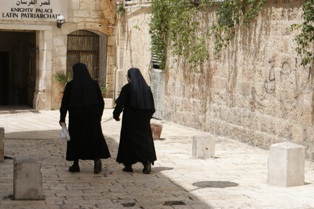Palestinian Politics

On the visit which I undertook we had a session with an up-and-coming Palestinian politician in Bethlehem, a Christian. I report his views, which I found interesting.
This man gave a dramatic sense of what it had been like to be young during the first intifada of the 1980s. Intifada of course means ‘throwing off’. People stopped paying taxes, saying no ‘taxation without representation’: the money paid in taxes was coming back as military enforcement. They had to be self-sufficient if they were for example to cope with the roadblocks and curfews; the small town where he lived was under siege for 42 days. The tax officers came with the army and police, confiscating $5 million worth of machines, furniture etc. from this community. There were popular committees which organised everyday life; dealing with curfews, teaching people how to keep sheep, chickens and rabbits and so forth.
However this man thought non-violent direct action of little avail subsequent to Israel’s building of the wall, commencing in 2002: he said he hadn’t really comprehended that this could be done. There are today around 600 roadblocks in the West Bank. He thought the BDS (boycott, divestment and sanctions) movement on the part of the rest of the world an important way forward: there was no solution in South Africa without a boycott. The PA should stop negotiating with Israel. Israel has said it will dig sunken roads to connect the Palestinian areas and build industrial zones. But the investors will own this, while the Palestinians will provide cheap labour. Did tens of thousands die for this?
Further, this man commented as follows on the politics of the situation. Israel wants an end to the Palestinian struggle, but the Israelis want it to end their way. Israel has to drop the idea of a Jewish state: the 1.2 Moslems and Christians living in Israel can become the majority. The Israelis are thinking of ways to rid themselves of the Israeli Arabs. As a precondition for talking to them they want them to swear loyalty to Israel as a Jewish state. (Whither Now?) The idea of a ‘Jewish state’ and a democracy can never come together. He is against the idea of a religious state in which people are classified. He wants one state in which everyone has their rights.
As for the West Bank, it has borders only with Israel (and Israel controls the border with Jordan). A Palestinian state is not viable without water, contiguity of land and an economy. No peace can come about in Palestine without Hamas. They gained an overwhelming victory (in the 2006 elections). You have to respect people’s choice. Fatah handed over authority in a democratic manner and everything was OK until Israel subverted the situation with their plan to end Hamas’ rule. Hamas acted in self defence (in taking over Gaza). In Gaza security is much better than when Fatah was in charge. But owing to the blockade the economy is terrible. He didn’t see a Palestinian unity government coming: superpowers do not find it good that the Palestinians should be unified; rather keep the instability. The Arabs, he commented, seem to have a choice between corruption or fundamentalism; it’s the same in Egypt, in Jordan.





All photos on this page: Susan Barry
Podcast:
Ghada Karmi, ‘International Support and Involvement in Psycho-active Work/Acknowledgement’, 15-16 Oct. 2009.
See Further on this Site: